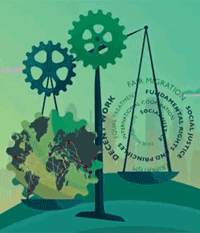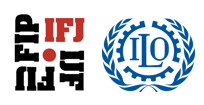
There is a marked divergence between the widely demonstrated economic benefits of migration and its often negative media portrayal and public perception of its impact. Too much coverage is sensationalist, inaccurate, discriminatory and can contribute to hatred, xenophobia, violence and exploitation against migrant workers.
The ILO and the IFJ believe that promoting rights-based reporting on labour migration, and supporting journalists to produce balanced reporting that tells all sides of the story can help redress the balance.
By bringing together migrants, media, journalists, policy-makers, workers representatives and advocacy groups, by providing facts and statistics, by making available guidelines and best practice examples, by promoting dialogue and professional ethics we hope to contribute to raising the standards of reporting on labour migration.
The reporting of fair recruitment and forced labour is highly sensitive as it potentially exposes a network of powerful interests in the exploitation of labour and such reporting will not be universally popular.
Understanding the obstacles to media taking on such issues, and working with editors and journalists, will be essential to providing the necessary professional backing to those who, tackling this alone, could be exposed to significant personal risk.
Having the engagement and backing of national journalists’ unions whose role is to protect media workers from intimidation for their work is essential to the long-term success.
